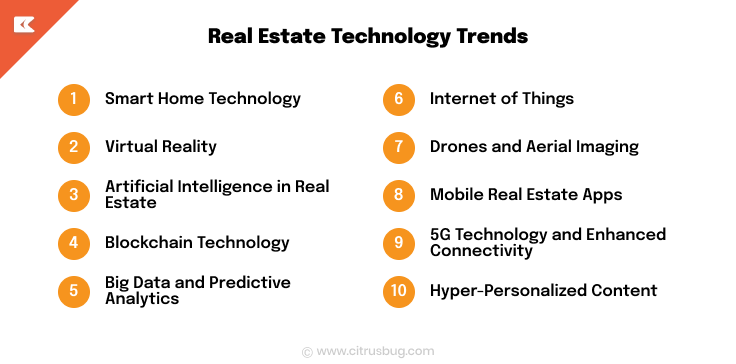Top 10 Real Estate Technology Trends: Redefining the Industry
- January 22, 2025
-
3588 Views
- by Ishan Vyas

Real estate agencies are taking advantage of new technologies as the industry undergoes rapid changes. Technologies like AI to locate houses, generative AI to enhance property marketing strategies, and VR tours are revolutionizing the ways people purchase, rent, or sell homes. These advancements do not just improve the effectiveness of processes; they also boost customer satisfaction and assist businesses in making more informed choices. In a market that changes rapidly, being informed of the latest trends is crucial to remain at the forefront. Here, we will look at the real estate technology trends.
An Overview of the Real Estate Industry Market
Real estate is now integral to modern life. It is a major factor in shaping communities and provides endless opportunities. If demand rises and new development opportunities emerge in the real estate industry, it can profoundly impact our everyday lives and business processes.
Proptech has revolutionized the real estate field in recent years, transforming how professionals sell, buy, and manage properties. Proptech refers to cutting-edge tools and services that make the real estate process easier to use and more user-friendly. From AI-powered analytics to blockchain technology to secure transactions, the latest innovations have transformed the field. An increasing number of businesses are adopting proptech software, designed to meet their specific needs. By integrating marketing strategies, proptech helps businesses stay ahead in their market.
The global real estate market is projected to achieve an impressive value of US$654.440 trillion, with residential real estate comprising 54% of the total. Analysts anticipate annual growth of 2.69%, driving the market to reach US$727.80 trillion by 2029.
Experts expect the United States to lead the global economy, projecting it to achieve an estimated value of US$136.6 trillion in 2025. This is due to the increasing demand for living in suburban and remote areas, the nation’s vast capacity for economic growth, and its potential to contribute in the future.
(Source: https://www.statista.com/outlook/fmo/real-estate/worldwide)
Real Estate Technology Trends
Real estate technology is rapidly evolving, bringing transformative solutions that cater to modern buyer demands. Let’s explore the key trends of real estate technology shaping this dynamic industry in 2025.
1) Smart Home Technology
Internet-connected devices integrate into a smart home, enabling homeowners to remotely monitor and manage various systems, such as heating, lighting, and security. This innovative technology transforms traditional homes into intelligent spaces, enhancing functionality and user convenience.
Home automation, or domotics, is often referred to as home automation. The term is derived from the Latin word domus, which means smart home. Technology allows users to manage their devices effortlessly. It provides convenience, energy efficiency, and enhanced security. All are accessible via smartphone apps or other connected devices.
Thanks to technological advances, the smart home has become increasingly popular. An analysis of 2024 found that 57% of U.S. homeowners now have at least one smart home appliance. The adoption rate for smart home devices is expected to increase rapidly over the coming five years as many people recognise the benefits of automated living solution
2) Virtual Reality
A significant real estate technology trend, virtual reality (VR), is revolutionizing how buyers explore and purchase properties. By offering immersive digital tours, VR enables potential buyers to remotely experience a property in a highly interactive and realistic environment.
The advancement of VR technology has pushed real estate to the next level, revolutionizing how transactions are handled. With virtual tours, buyers are able to visit and examine the properties virtually at any time, increasing convenience and accessibility. As the need for sustainable, effective, and innovative solutions grows, VR is becoming increasingly popular in the business, allowing seamless transactions between sellers and buyers without having to attend physically-based meetings.
3) Artificial Intelligence in Real Estate
AI is transforming the real estate industry, improving efficiency and decision-making for everyone from investors to commercial property solicitors. Predictive analytics is among the main AI tools currently used. By analyzing information, it can forecast market developments, property values, and investment opportunities. This helps real estate agents and investors make better decisions and be better informed.
AI chatbots are becoming the most popular tools. They answer customer queries, schedule tours of properties, and even suggest homes. The chatbots help in the process and make it easier and more efficient. Paired with real estate text message marketing, chatbots allow real estate businesses to communicate with prospects in real time, keeping conversations active and engagement high. As AI continues to develop, it will have an even bigger impact. Among the top AI trends in real estate, predictive analytics and chatbots lead the way.
4) Blockchain Technology
To all tech lovers out there, you may be wondering how blockchain is incorporated into real estate. Blockchain is quickly becoming the most popular Proptech technology for the right reasons. Real estate transactions usually involve large financial sums and sensitive personal details, so security and efficiency are vital.
In the past, property transactions were conducted through in-person meetings or cash payments. Blockchain revolutionized the process, allowing secure and transparent electronic transactions. It reduces risk, assures the accuracy of data, and speeds up the process. With its ability to transform conventional methods, Blockchain is undeniably reshaping the direction of real estate in the future.
5) Big Data and Predictive Analytics
The real estate industry produces huge amounts of data every day, from transactional to demographic data. Big data converts data into valuable insights that can reduce the risk of failure, increase customer engagement improve valuations, and provide AI-driven choices. Analytics that predict trends can help you forecast them and improve portfolios, making them an important investment priority.
Modern tools, such as the real-time valuation model, frameworks for risk assessment, and sentiment analysis, are changing the property market. Platforms such as Reonomy and Enodo Score use these technologies to provide detailed information about properties that guide renovation and investing strategies.
professionals should focus on data security to fully benefit from these advances; Strong data security will ensure the integrity of data while also allowing for more intelligent, data-driven real estate choices
6) Internet of Things
The Internet of Things (IoT) revolutionizes the real estate industry by making homes smarter as well as more efficient and secure. It connects systems and devices that allow real-time monitoring, automatization, and control. From sensors for thermostats and cameras for security,
IoT solutions can help you optimize your usage of energy, forecast maintenance requirements, and avoid expensive difficulties. Property managers can track utilities to detect problems, identify faults, and handle emergencies with an integrated system. Tenants are able to enjoy personal comfort thanks to automatic lighting and the ability to control temperature, as well as upgraded security measures.
As IoT adoption increases, this technology is revolutionizing property management and people’s interactions with their homes. It improves efficiency, encourages sustainability, and can add significant value to property.
7) Drones and Aerial Imaging
Drones and aerial photography are transforming the real estate industry by providing innovative ways to display and appraise properties. Real estate professionals employ drones to create quality videos and images and provide potential buyers with detailed perspectives of the properties. Drones offer aerial perspectives, as well as property layouts and surroundings.
Drones make property inspections easier and faster. They can access hard-to-reach areas, helping identify issues without expensive equipment or risk. agents and developers depend on aerial photography to draw attention to the best features of their properties, design ad materials, and carry out accurate surveys
This method of technology reduces time, cuts costs, and helps improve the appearance of properties. Drones help real estate agents provide the best experience for potential customers while streamlining their processes.
8) Mobile Real Estate Apps
The real estate market is rapidly adopting technological advances as consumers become dependent on smartphones. A responsive website or app alone is no longer enough. With 93% of customers using real estate websites and 73% relying on mobile apps, having a strong mobile presence is crucial for businesses to stay competitive.
The millennial generation is leading the way, with 91% of them searching on the internet and 76% purchasing homes using mobile apps. This trend highlights the increasing demand for apps in the real estate industry to increase visibility and draw prospective buyers.
Mobile apps increase realtors’ involvement and lead generation. As competitors rapidly use this technology, companies should enter the mobile app market to be successful.
9) 5G Technology and Enhanced Connectivity
5G technology is revolutionizing real estate by enabling faster, better, and more reliable connections for clients and businesses. With improved speeds and less latency, 5G enables seamless communications, real-time data exchange, and more efficient property management. A real estate VoIP system can further enhance these capabilities by streamlining calls and virtual interactions. Realtors can now offer high-definition virtual tours and oversee properties more efficiently using smart devices.
Upgraded connectivity can also allow for speedier, more accurate home searches and personalized advice for consumers. Furthermore, 5G enables more seamless integration between smart home appliances, enhancing tenant customer experiences and energy efficiency. With the growth of 5G, real estate companies will be able to take advantage of more possibilities for innovation and increased customer engagement.
10) Hyper-Personalized Content
The rise of hyper-personalized content is changing the world of real estate, offering personalized content to prospective tenants and buyers. With the help of information and AI, businesses can design specific content to meet individuals’ preferences, interests, and requirements. This method increases engagement by providing relevant information about properties, including neighbourhood details and specific marketing.
Real estate platforms are now tracking their users’ behavior and providing customized advice and even alerts. Personalizing recommendations for property companies increases the likelihood of turning leads into sales. Personalized content can help realtors establish more solid relationships with their clients, making home buying easier and more enjoyable.
Summing Up!
In conclusion, the rapid advancements in real estate technology trends are transforming how the industry operates, making processes more efficient and customer-centric.Technologies like IoT, AI, 5G, and hyper-personalized content are revolutionizing property management, marketing strategies, and overall customer experiences. This technology allows businesses to improve efficiency, decrease costs, and boost the quality of their decisions, giving them a distinct advantage in the competitive marketplace.
Real estate software development companies have a major role in facilitating this change. They design cutting-edge solutions that allow businesses to take advantage of technological advances, such as intelligent property management systems, artificial intelligence-powered analytics tools, and modern platforms for customer interaction. By partnering with a real estate software development companies can implement specific solutions designed to fit clients’ particular needs and issues
In a world where the real estate market is growing, taking advantage of technologies is no longer a choice. It is a must for success. Companies that incorporate advanced technology and tools can offer superior services, exceed customers’ demands, and gain an edge in a competitive market.





 SaaS Development
SaaS Development Web Application Development
Web Application Development Mobile Application Development
Mobile Application Development Custom Software Development
Custom Software Development Cloud Development
Cloud Development DevOps Development
DevOps Development MVP Development
MVP Development Digital Product Development
Digital Product Development Hire Chatbot Developers
Hire Chatbot Developers Hire Python Developers
Hire Python Developers Hire Django Developers
Hire Django Developers Hire ReactJS Developers
Hire ReactJS Developers Hire AngularJS Developers
Hire AngularJS Developers Hire VueJS Developers
Hire VueJS Developers Hire Full Stack Developers
Hire Full Stack Developers Hire Back End Developers
Hire Back End Developers Hire Front End Developers
Hire Front End Developers AI Healthcare Software Development & Consulting
AI Healthcare Software Development & Consulting Healthcare App Development
Healthcare App Development EHR Software Development
EHR Software Development Healthcare AI Chatbot Development
Healthcare AI Chatbot Development Telemedicine App Development Company
Telemedicine App Development Company Medical Billing Software Development
Medical Billing Software Development Fitness App Development
Fitness App Development RPM Software Development
RPM Software Development Medicine Delivery App Development
Medicine Delivery App Development Medical Device Software Development
Medical Device Software Development Patient Engagement Software Solutions
Patient Engagement Software Solutions Mental Health App Development
Mental Health App Development Healthcare IT Consulting
Healthcare IT Consulting Healthcare CRM Software Development
Healthcare CRM Software Development Healthcare IT Managed Services
Healthcare IT Managed Services Healthcare Software Testing services
Healthcare Software Testing services Medical Practice Management Software
Medical Practice Management Software Outsourcing Healthcare IT Services
Outsourcing Healthcare IT Services IoT Solutions for Healthcare
IoT Solutions for Healthcare Medical Image Analysis Software Development Services
Medical Image Analysis Software Development Services Lending Software Development Services
Lending Software Development Services Payment Gateway Software Development
Payment Gateway Software Development Accounting Software Development
Accounting Software Development AI-Driven Banking App Development
AI-Driven Banking App Development Insurance Software Development
Insurance Software Development Finance Software Development
Finance Software Development Loan Management Software Development
Loan Management Software Development Decentralized Finance Development Services
Decentralized Finance Development Services eWallet App Development
eWallet App Development Payment App Development
Payment App Development Money Transfer App Development
Money Transfer App Development Mortgage Software Development
Mortgage Software Development Insurance Fraud Detection Software Development
Insurance Fraud Detection Software Development Wealth Management Software Development
Wealth Management Software Development Cryptocurrency Exchange Platform Development
Cryptocurrency Exchange Platform Development Neobank App Development
Neobank App Development Stock Trading App Development
Stock Trading App Development AML software Development
AML software Development Web3 Wallet Development
Web3 Wallet Development Robo-Advisor App Development
Robo-Advisor App Development Supply Chain Management Software Development
Supply Chain Management Software Development Fleet Management Software Development
Fleet Management Software Development Warehouse Management Software Development
Warehouse Management Software Development LMS Development
LMS Development Education App Development
Education App Development Inventory Management Software Development
Inventory Management Software Development Property Management Software Development
Property Management Software Development Real Estate CRM Software Development
Real Estate CRM Software Development Real Estate Document Management Software
Real Estate Document Management Software Construction App Development
Construction App Development Construction ERP Software Development
Construction ERP Software Development








